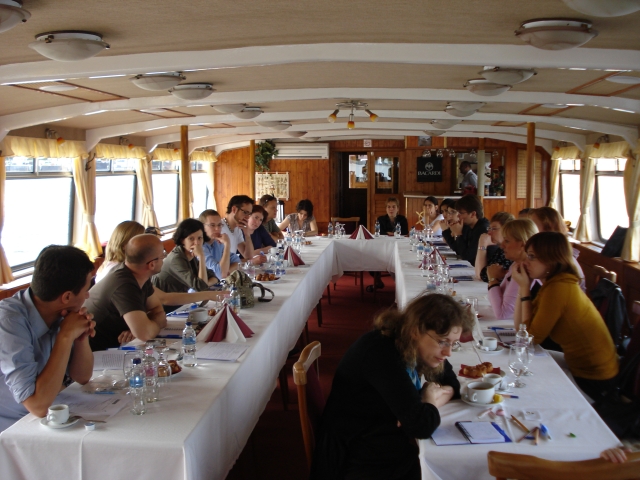The European Union has accepted a distinguished role as a “civilizatory” power in the Western Balkans. It has been its long-standing supporter (witness the Stability Pact for South Eastern Europe); it devoted its energy to overcoming internal problems with misconceived nationhood concepts like in Macedonia; and growing international criticism notwithstanding it has become a guarantor of state-building, economic development and civil reconciliation in Bosnia, Kosovo and beyond.A refined structure had been chosen for OpenForum Budapest, the event organized by Citizens of Europe and its partner Hungarian Europe Society that successfully concluded the second cycle of the 2008/09 OpenFora programme entitled “Contemporary Challenges to Europe”.
From 8 to 10 May 2009 25 professionals, youth workers, experts as well as multipliers from the Western Balkans and across Europe gathered in Budapest to discuss and to reflect on the current situation in the region. We started out with a comparison of the European and Balkan perception regarding the European Union in general as well as the impact of EU policies on Balkan societies.

“The Western Balkans – Europe’s (un-)wanted challenge?” was the topical name of the debates in which participants and panelists gave an outline of recent reforms within Balkans societies. Leaving the usual geopolitical considerations on the role of the United States, Russia and China pretty much aside the initial debate with Péter Györkös (Ambassador of Hungary to Croatia) and Tibor Várady (Professor at Central European University, Budapest) set the path for an analytical approach towards the historical roots of contemporary social and political conflicts in the region. It is important to deal with those entrenched traditional and conflict-based mentalities which continue to create obstacles against the development towards peace and prosperity. The projection of the documentary “Whose is This Song? (Adela Peeva, Bulgaria, 2003) stimulated vivid discussions on how nationalist approaches have been adopted and promoted by various governments, making it difficult for people to overcome barriers, develop a sense of solidarity and understand the meaning and blessings of a common approach to history and a regionally shared heritage in everyday life.
On Saturday Pero Lastic’ (representative of the Serbian Municipality Szentendre, north of Budapest) offered some insights into the historical and contemporary importance of cultural heritage and diversity in the Western Balkans. The role of civil society in the Western Balkans was of major interest during the debates. Participants analyzed the priorities that should be set and shared ideas and experiences on best practices. Starting out from a general approach the forum finally came up with some more concrete examples on how cross-border cooperation between Balkan activists can be fostered and how they could work more efficiently in order to overcome the lack of structure, resources and compliance from which all states in the region suffer badly, although to varying extents. Participants were focused on reaching beyond idealism to create a fertile ground for further collaboration and joined efforts for reconciliation and local development.
All events of the OpenFora cycle “Contemporary Challenges to Europe” will be evaluated during a coordination meeting in Berlin on 29-31 May 2009. Documentation material will be published this summer.
